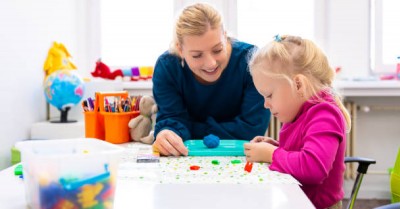Play comes naturally and effortlessly to young children. It is self-driven, active and intrinsically enjoyable. Along with helping children pass through appropriate developmental stages and negotiate their way through the immediate environment, the play also enables the externalization of feelings and mastery over emotions. In this way, play becomes the source and medium of therapeutic powers which facilitate or mediate change in the child. According to research, therapeutic powers of play can be understood in four broad categories.
Self-expression
Play both promotes and facilitates communication. As children engage in play with peers and adults, they learn to use sounds and then the language to express their needs, likes and interests. Eventually, they get better at using verbal as well as non-verbal language for communication. Pretend play or dramatic play offers a lot of opportunities to children to explore emotions by adopting personas, using objects symbolically and even creating imagined narratives. Therapists can use all these forms and aspects of play to access children’s unconscious and facilitate self-expression.
Self-regulation
Playing with peers and others helps children to negotiate their way around different types and degrees of emotions. As they play with each other, children experience curiosity, happiness, frustration, anger, exhaustion, anxiety, expectation and many other feelings. Therapists can use modelling and education to help children become aware of distressing feelings and acquire strategies for emotional regulation. At the same time, they learn to identify positive emotions and with increasing maturity, are able to actively bring about positive emotional states for themselves.
Social Relationships
Constructive social interactions are a very important aspect of emotional well-being. Through peer and group play, children acquire a range of social skills which therapists can build on to nurture attachment, social competence and empathy.
Self-growth
Through play, children learn to initiate creative planning, decision making and problem-solving. All these help the child attain holistic development and improved self-esteem as well.
What Is Play Therapy?
Though play offers ample therapeutic opportunities, only a registered play therapist can initiate the psychological ‘holding’ relationship within which change can be brought about. Besides necessary training, supervision and personal therapy, such a practitioner must also be approved by a regulatory body such as the Australasia Pacific Play Therapy Association2.
What Does Play Therapy Entail?
Once the play therapist receives a referral from a parent, para-professional or professional, the therapeutic process begins.
- The first step is the intake session attended by the child, their parents, teachers, carers and other health professionals.
- After gathering information about the developmental history, family background and learning environment of the child, the therapist organizes the play space. During an initial session, the space is demonstrated to the child and questions are asked.
- There is no hard and fast rule about the requisite number of sessions. The duration and frequency of sessions are decided in consultation between the therapist and the child’s guardians. When it is time to end, the therapist communicates the decision to all key stakeholders.
References:
- Schaefer, C. & Drewes A. (2014) The Therapeutic Powers of Play: 20 Core Agents of Change (2nd Edition). New Jersey, N.J. Wiley
- Inclusion In Action For Children With Additional Needs, Belonging Early Years Journal
